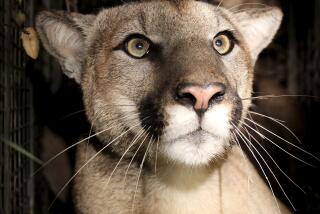Lean Times Spark Rural Battles for Edible Game Killed on Roads
- Share via
MISSOULA, Mont. — Times are so lean in the north country this winter that this state and its citizens are fighting over road-kills.
Rural Americans have long coped gamely in times of recession by eating the deer, elk, moose and even bear killed by cars. But a motorist can’t simply butcher what he hits; permission is required and game wardens often donate the take to the needy. This year, however, the food bank that receives most of Montana’s salvaged road-kill suddenly has illegal competition.
“Since it turned cold in October, I’d say at least 40% show up missing,” when food-bank crews arrive to scoop up the corpse, said Bill Davison, who operates the Flathead Food Bank in Kalispell, 150 miles north of here. The culprits, he suspects, are eavesdropping on road-kill reports by using police-radio scanners. Davison said he is ready to ask the local sheriff to set up a sting operation to catch the body snatchers.
“Most Montanans look at it and say, ‘Gee, that’s a good piece of meat and shouldn’t go to waste.’ ” said wildlife officer Ed Kelly, who theorizes that a couple hundred pounds of meat lying by the roadside may be all the more appealing during the current recession. “What we want them to do is call in so that it can go to the people who are most needy.”
In many states, a motorist who hits an animal gets first crack at it--but only after notifying local authorities.
Georgia issues an “honorary deer tag,” and in Wisconsin a “red tag” lets a driver keep the kill. Michigan last year started letting hunters who collided with a deer, pheasant, turkey or other protected species to forgo the chase and use their game tags for the road-kill. Minnesota used to charge $8 for a deer killed by a car, until it realized the paperwork cost at least three times that amount.
“We have oodles of cookbooks on cooking your car kills,” said Nancy Huonder, a spokeswoman for the Minnesota Department of Natural Resources. “Some are serious game books but you also have recipes with names like ‘splattered deer’ and ‘skunk a la tire.’ In states with lower populations and higher wildlife numbers, you’re going to have enough car kills to generate a cookbook.”
In urban states where increasing collisions with deer are driving up auto insurance rates, road-kill policy is trickier. New Jersey had a “dead deer pickup program” that distributed venison to the needy until the state’s austerity regime killed it two years ago.
The swank township of Princeton, N.J., responded last year to a staggering bumper crop of 200 road-killed deer by revoking a 20-year ban on hunting and letting sportsmen thin the herd.
California, however, can’t even make hamburger out of most of its road-kill.
“Unfortunately, in a state like this, when somebody hits a deer, they’re likely to be going the speed limit so neither the deer nor the automobile do too well,” said Jim Zobel, a spokesman for the state’s Wildlife Protection Division. When the meat is not fit for prison-camp inmates, forest firefighters or charity, it may go to feed zoo animals or to Indian reservations, where hides and antlers can be put to ceremonial use.
The road-kill business also has its quirks. Minnesota, for example, forbids dispatching a road-injured animal with a gun because the wound could be confused with the work of a poacher.
Despite competition from road-kill poachers, the Flathead Food Bank processed 4 1/2 tons of hamburger from road-killed animals last year. Everything goes into the grinder, said Davison, “because we can’t give one person a steak, another a rump roast and another person ribs.”
It costs the food bank only 15 cents a pound for the processing--a lot cheaper than the 60-cent cans of tuna that most food banks distribute. And Davison does not like the term “road-kill,” so he labels his burger “game” regardless of mammal or cut.
Even if motorists can keep the critters they hit, it is not usually wise to aim deliberately for animals on the road, because when a car and a deer collide at high speed, it is hard to tell who gets the worst of it.
“If somebody really put their mind to it they could purposely hit animals,” said George Burgoyne, assistant wildlife chief for the Michigan Department of Natural Resources. “But the likelihood of them doing that without damage to the vehicle is fairly small.”
More to Read
Sign up for Essential California
The most important California stories and recommendations in your inbox every morning.
You may occasionally receive promotional content from the Los Angeles Times.













